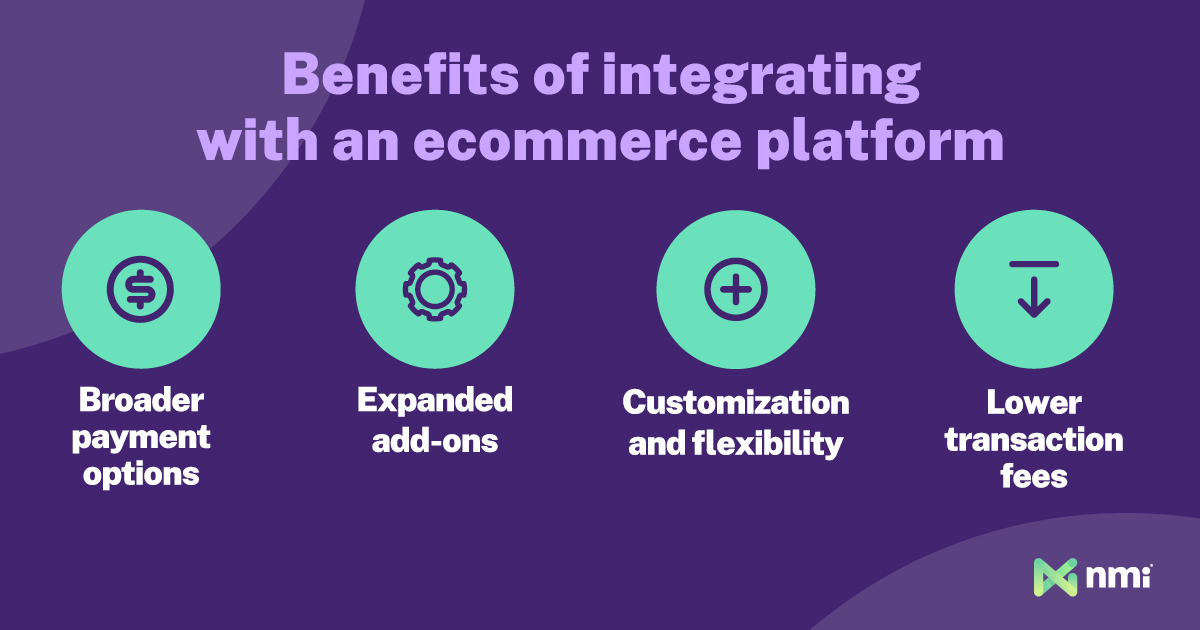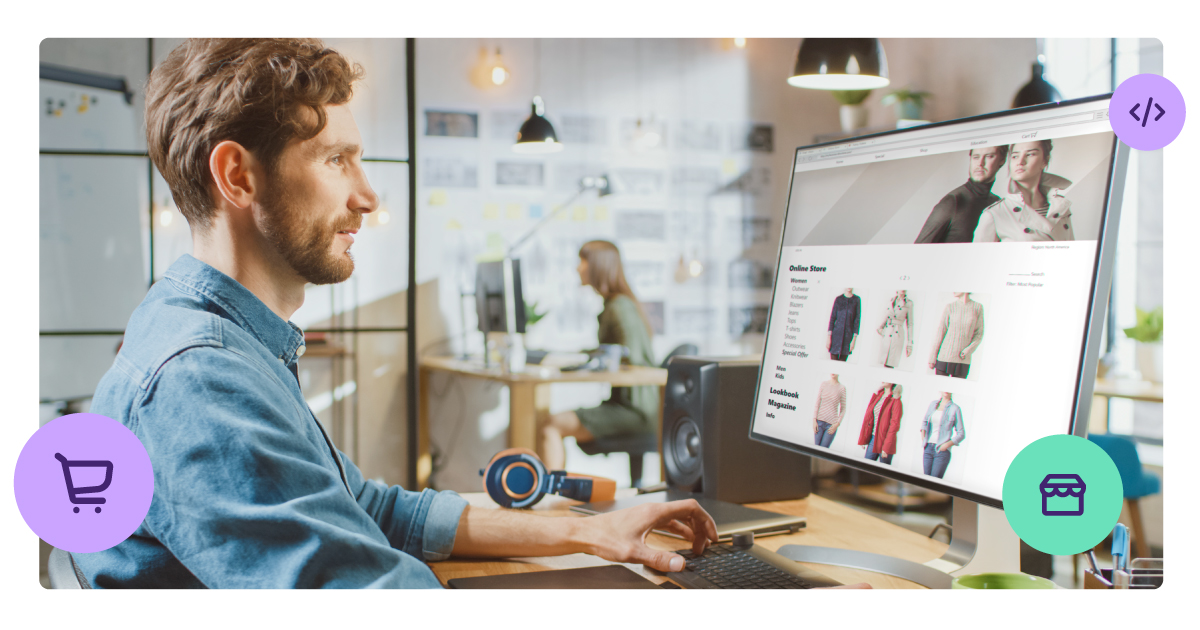Global retail ecommerce sales have more than tripled in the past decade, hitting $5.8 trillion USD. That number is expected to hit $8 trillion by 2027, making up over 40% of all retail sales. eCommerce is an important channel, with omnichannel payment solutions becoming the expectation among consumers.
To grow their digital footprint and meet the demand for fast, seamless payment experiences, small- and medium-sized businesses (SMBs) are looking for better ways to sell online. For most, the best solution is using an all-in-one ecommerce solution that can help them start selling quickly, and with minimal effort.
Large ecommerce platforms like Shopify are designed to streamline selling online. They make it possible for even the least experienced new seller to quickly and easily operate an online store. These platforms help businesses meet their customers online without them taking on the headache or cost of complex web development.
In addition to ecommerce platforms, there has been an explosion in third-party applications and integrations. These add-ons allow users to customize their ecommerce sites beyond what the core platform offers. That combination of ease, convenience and bolt-on custom functionality has made platforms the choice of small sellers and big brands alike, including giants like Red Bull, Heinz and Mattel.
Naturally, payments are a crucial part of any ecommerce site. Built-in systems may work for hobbyists and micro businesses, but outside payment tech integrations have become a critical part of ecommerce for many business owners. They also provide a new opportunity for app developers and software vendors.
In this article, we’ll explore:
- Why so many SMBs lean on ecommerce platforms like Shopify
- The benefits of offering merchants unique ecommerce payment solutions over the platform’s built-in offering
- How partnering with a modular ecommerce payment gateway provider can enhance ecommerce functionality (and your offering)
How Platforms Like Shopify Improve eCommerce
Platforms like Shopify simplify the complexities of creating and managing an ecommerce website. They are successful because they enable even non-technical users to build professional ecommerce websites with low-code, no-code templates and easy-to-use drag-and-drop tools. Advanced users can customize their sites with traditional languages like HTML, Javascript or, in Shopify’s case, its open-source language Liquid. But they don’t have to.
Not having to code (or hire a coder) drastically reduces development costs. By shifting the cost from upfront development to a monthly subscription, users can spread out their investment. This enables SMBs to compete and grow with limited resources. Using a platform may cost more in the long run, but that’s a small price to pay once a seller is already established and successful.
eCommerce platforms are also feature-rich, offering SMBs nearly everything they need to operate online stores. For instance, with top platforms, a site owner can access:
- Online customer data
- Inventory managers
- Reporting and data analytics
- Invoicing systems
Most top platforms also offer app store integrations, enabling users to access features that aren’t included in the base platform. That makes scaling easy and reliable.
Finally, big-name ecommerce platforms are easy to trust. A small business opting to develop everything in-house has to worry about security, testing, ongoing updates, patches and more. However, a business opting for a big-name platform like BigCommerce or Shopify doesn’t; the platform will handle the nitty gritty details on its behalf, including secure payment solutions.
The Need for Integrated eCommerce Payment Solutions
For all they do well, one thing ecommerce platforms aren’t always great at is payments. Some popular platforms offer built-in payment solutions that users can easily turn on and go. While convenient, these payment solutions are normally very limited and are only ideal for small, new sellers.
To appeal to users with more advanced payment needs, platforms like Shopify allow payment providers to integrate with the platform and offer external solutions. Users can get their own payment processing and then quickly and easily integrate it into their site. This offers merchants more choice and flexibility in how they take payments for their business — a huge advantage for SMBs and their payment providers.
Some of the capabilities integrated payment solutions offer to ecommerce platform users include:
- Broader payment options: Businesses can go beyond traditional card payments, offering digital wallet integrations, real-time peer-to-peer rails, cryptocurrency payments and more
- Expanded add-ons: Users can access more optional payment functions like advanced fraud protection, card data security, subscription payments and Level 3 processing
- Customization and flexibility: Plugging in their own payment system enables platform users to change providers as payments tech evolves. That level of flexibility makes scaling payments easy
- Lower transaction fees: Integrating outside payments allows users to access lower transaction fees. Most platforms charge high rates in exchange for ease of use. As businesses grow, these fees can become a problem. Integrated payments enable users to keep the convenience but shed the high fees once they outgrow a platform’s built-in payments

The Role of eCommerce Payment Gateways in Online Payments
Payment gateways are a type of integrated payment solution. They act as the interface between the end customer making a payment and the complex backend systems that move money from a credit card to a seller’s bank account. Robust gateway providers like NMI power ecommerce with all the benefits listed above in one of two ways.
ISOs & PayFacs
First, merchant service providers like ISOs and PayFacs can resell gateways to merchants as a value-added service. By white labeling the gateway, payment providers can offer payment services in their own branding. The merchant can then easily integrate the gateway into their site using their ecommerce platform’s backend control panel.
Offering payment solutions through a third-party ecommerce platform like Shopify, in addition to your own services, will give your merchant clients more choice and flexibility over how they collect payments.
SaaS Platforms
The other option is to build a payment gateway into a third-party app. If you are a SaaS provider, you probably already have a payment gateway connected to your software. If not, you can learn why offering payment options to software users is so important here.
Most ecommerce platforms offer libraries of value-added services, like the Shopify App Store. If you’ve already partnered with a gateway provider like NMI, you can easily expand your offerings by adding ecommerce functionality through Shopify — all without having to find a new gateway vendor.
How to Choose the Best eCommerce Gateway Partner
Adding a gateway into an add-on app or a larger integrated payment solution starts with choosing the right gateway partner. They should offer white labeling and developer-friendly, low-code, no-code APIs and SDKs. That makes integrating payments into a wider app as easy as possible. Beyond that, the more services a gateway can provide, the more value it will offer to end users and the more attractive (and profitable) your payment services or SaaS platform will be.
NMI’s industry-leading payment gateway is designed to enhance the payment experience everywhere merchants do business, including ecommerce platforms and marketplaces. Our newly improved Shopify payments integration offers developer-friendly integration options and a vast set of payment features, so your merchant customers can have flexibility and choice over how they take payments.
By partnering with Shopify, our ISO and ISV partners can take advantage of a variety of unique benefits. Additionally, merchants currently using Shopify but seeking to change payment gateway can leverage the NMI payment platform through their ISO partner.
To learn more about the NMI gateway and how it integrates with top ecommerce marketplaces like Shopify, reach out to a member of our team today.
Don’t just turn on payments, transform the way you do business
- Generate New Revenue By adding or expanding payment offerings to your solution, you can start earning higher monthly and transaction-based recurring revenue.
- Offer the Power of Choice Allow merchants to choose from 125+ shopping cart integrations and 200+ processor options to streamline their onboarding.
- Seamless White Labeling Make the platform an extension of your brand by adding your logo, colors and customizing your URL.





